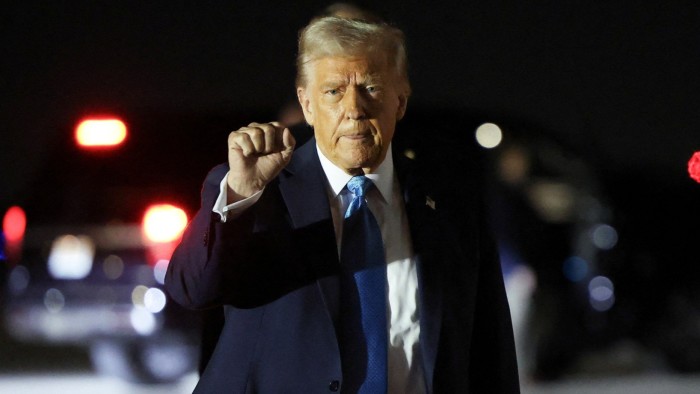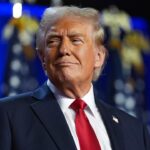Unlock the White House Watch newsletter for free
Your guide to what the 2024 US election means for Washington and the world
Donald Trump faced a backlash from business groups and some in his own Republican party after kicking off a trade war by imposing steep tariffs on the US’s three largest trading partners.
Trade associations representing consumer goods, oil, groceries and automakers lined up to warn that Trump’s new tariffs — which included 10 per cent tariffs on imports from China, 25 per cent on all imports from Mexico and Canada, excluding Canadian energy — would push up prices for ordinary Americans and cause chaos in supply chains.
“The president is right to focus on major problems like our broken border and the scourge of fentanyl, but the imposition of tariffs . . . won’t solve these problems, and will only raise prices for American families,” said John Murphy, senior vice-president of the US Chamber of Commerce, the US’s largest business group.
Consumer product groups warned that Americans would see more expensive groceries, while automakers warned the tariffs would raise the cost of building vehicles in the US.
“Tariffs on all imported goods from Mexico and Canada — especially on ingredients and inputs that aren’t available in the US — could lead to higher consumer prices and retaliation against US exporters,” said Tom Madrecki, vice-president of supply chain resiliency at the Consumer Brands Association.
Three separate trade groups representing Mexican tequila, US bourbon and Canadian whisky warned that a North American trade war would exacerbate a slowdown in the sale of spirits and liquors.
The criticisms come a day after Trump imposed steep tariffs on Canada, Mexico and China, catapulting economic nationalism to the top of his agenda while railing against the US trade deficit with its trading partners.
In response, Canadian Prime Minister Justin Trudeau announced 25 per cent tariffs on C$155bn (US$107bn) worth of goods, including US alcohol, clothing, household appliances and lumber.
Mexico’s President Claudia Sheinbaum was expected to soon announce tariffs as well after warning of retaliatory measures.
Trump stepped up his attacks on US trading partners on Sunday, taking to social media to rail against the US trade deficit and repeat his demand that Canada become “a 51st state”.
“We pay hundreds of Billions of Dollars to SUBSIDIZE Canada. Why?” He posted on Truth Social.
“There is no reason. We don’t need anything they have. We have unlimited Energy, should make our own Cars, and have more Lumber than we can ever use. Without this massive subsidy, Canada ceases to exist as a viable Country. Harsh but true! Therefore, Canada should become our Cherished 51st State.
The aggressive new trade measures were criticised by lawmakers including Tim Scott, the Republican Senator for South Carolina, who branded them “nothing more than a tax on South Carolinians”.
“I understand and appreciate the willingness to take on the dubious actions of countries like China who constantly break and ignore the rules, but treating our close, long-term allies the same way is unproductive at best,” Scott wrote on X.
Congressional Democrats slammed Trump’s move.
“These reckless tariffs take a sledgehammer where a scalpel is necessary, and the American people will pay the price,” said Richard Neal, the top Democrat on the House of Representatives committee overseeing trade policy.
“Targeted, thoughtful measures aimed at specific industries can protect American interests and workers, and demonstrate thorough policymaking,” Neal added. “That’s not what the President is doing.”
The Peterson Institute estimated last month that Trump’s threatened sanctions would cause economic damage for all the countries involved, including the US.
A 25 per cent tax on imports from Canada and Mexico would result in a hit of around $200bn to the US economy for the duration of Trump’s term, it estimated. The economic hit to the US from higher tariffs on Chinese imports would be $55bn. US inflation would also rise.
Goldman Sachs research analysts wrote on Sunday that “it is more likely that the tariffs will be temporary” due to their potential economic impact and the White House setting general conditions for their removal.
The investment bank had previously estimated that a long-term 25 per cent tariff on imports from Canada and Mexico would raise core personal consumption expenditure prices by 0.7 per cent.







